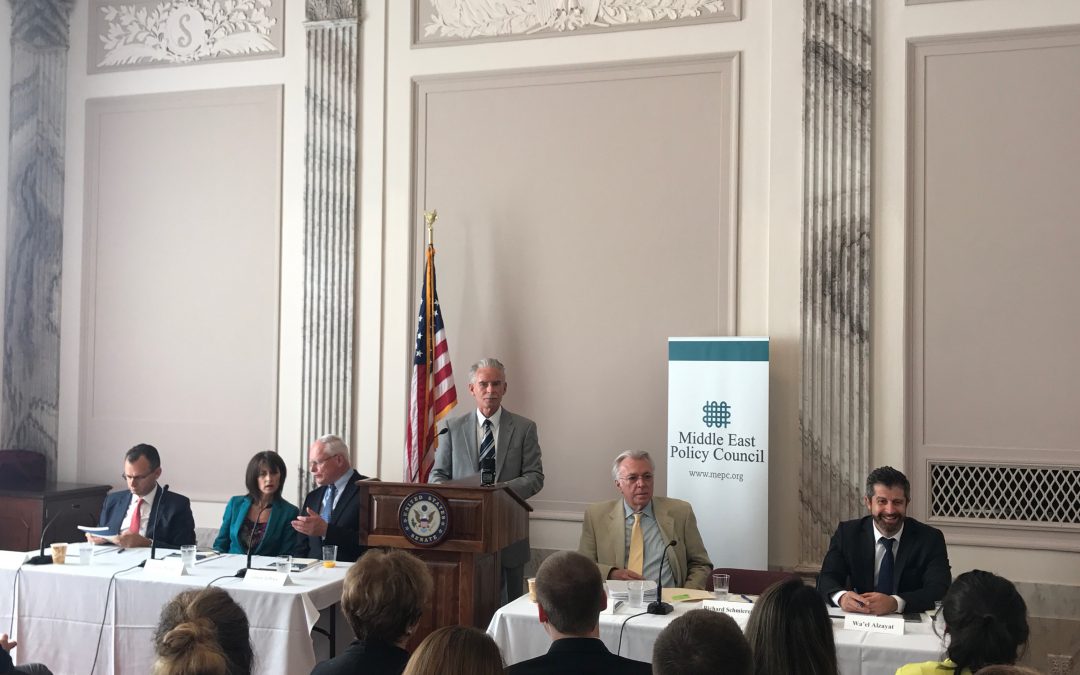WASHINGTON – A clear strategy to win the fight against ISIS and provide strong economic and political support to rebuild Iraq and Syria is they key to preventing another power vacuum, foreign policy experts told an audience at the Russell Senate Office Building on Friday.
Panelists at a Middle East Policy Center event titled “Post-ISIS Iraq and Syria: Avoiding Chaos” said that the U.S. and its partners should develop a policy that empowers the Iraqi government institutions and works toward an eventual political settlement in Syria.
This event comes just days after Iraqi Prime Minister Haider al-Abadi declared victory against ISIS in Mosul, the largest city that it held and Iraq’s second largest city. The fight against ISIS in Raqqa, the Syrian city that the group claims as its capital, continues.
The panel members agreed that the outlook for the future of Iraq is currently significantly better than that of Syria: whereas Iraq now has legitimate institutions and relations with major world and regional powers, Syria does not.
Additionally, Iraq has significant oil resources that Syria lacks, and Syria has been way more devastated in all major cities than Iraq.
Nevertheless, the panel consensus was that the opportunity in both countries lies in staying the course to defeat ISIS and promoting stability and freedom.
Paul Salem, vice president of policy analysis, research and programs at the Middle East Institute, said that the struggle for human rights, reasonable government and equal opportunity has been the story of both countries since before the rise of ISIS.
According to Salem, dynamics have caused the chaos that is the subject of the panel discussion. A fight for influence has characterized the region since World War I, and it has evolved into a fight for influence between regional actors, with often devastating consequences.
Wa’el Alzayat, former senior policy advisor on Iraq and Syria, said that large structural problems in the Middle East explain the emergence of ISIS and the framework for which the region must be addressed to prevent another organization like ISIS from emerging.
“From Morocco to Iran, the region lacks basic rights and opportunities for its citizens,” Alzayat said. He said that good governance, freedom and economic progress will be essential in rebuilding Iraq and Syria.
James Jeffrey, former U.S. ambassador to Turkey and Iraq, said that the first policymaking step is for the U.S. to consider what it wants with Iran, and how that is going to play out in Iraq and Syria.
The other panelists agreed that Iran is a major destabilizing influence in the region as a whole, and in these two countries in particular. The U.S.’s relationship with Iran must be managed to ensure the best possible outcome while rebuilding Iraq and de-escalating Syria.
“We should expect that these regional states are going to continue to take advantage of this opportunity of these weak states that are highly fragmented,” said Denise Natali, a Georgetown professor and former USAID worker in Iraq.
Despite the fragmentation, Natali rejects the idea that Iraq and Syria are going to split into independent ethnic regions. The narrative often heard in Washington, which she has heard since the U.S. invasion of Iraq in 2003, is that Iraq is going to break into smaller ethnic regions – including Sunni, Shia and Kurd. This is not going to happen, Natali said.
There is ethno-sectarianism, but that’s not the way these countries are moving forward,” Natali said. The ethnic groups have become hyper-fragmented within their region, and ultimately they are landlocked and depend on the state, she said.


